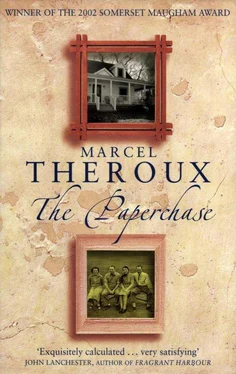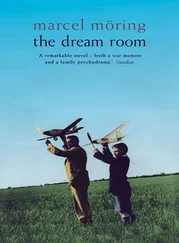*
On one of my first night shifts after the phone call from my father, Wendy asked me to put together an item about a famine in Indonesia. I got the research department to send me over a whole screed of articles about the place.
At two o’clock in the morning, I was sitting in the tea bar reading about the Stone Age tribes who lived in the mountains of New Guinea. One of the articles was lamenting the decline of their culture, and saying that they simply weren’t equipped for the brutal struggle that we accept as twentieth-century living. They were useless workers: after five minutes of digging a ditch, they would just get bored and go off for a smoke and a cup of tea. They wore penis sheaths and composed epic insult poems in blank verse. They conducted mock battles with one another. The apparent strangeness of their lives started me thinking about the conventions of my own tribe. What would an ethnographer say about me?
I defied nature by working at night. I made myself dyspeptic over fictional deadlines. I hoarded money. I was postponing life until I felt I’d earned enough to deserve it. I was very superstitious, believing my destiny to be controlled by a priestly class called Management. I lived alone.
I realised that although I felt bitter about life, I had experienced only a small corner of it. It was like rubbishing the whole of Indian cuisine on the evidence of the chicken tikka sandwich I’d just bought from the Headlines Tea Bar.
On the tube home, I could feel the decision to leave ripening inside me. The woman opposite me was sniffling from a cold and reading a voluminous guidebook to India. Then, somehow, a moth got into the train through one of the windows. It fluttered along the length of the carriage like a scrap of paper, unnoticed, except by me, and then exited through a window farther down the train into the blackness of the tunnel beyond.
I got home and switched on the television to see the morning news, half expecting my decision to be announced. My shoes had been bothering me on the journey home, so I slipped them off and tipped them out on the carpet, where each one left a tiny pile of golden sand.
MY IMMEDIATE FAMILY were reverse migrants — Americans who left the New World for the Old, and promptly became a kind of parody of Englishness. Americans like them created the idea of shopping-mall Europe: the belief that the continent is actually a collection of themed boutiques where you go to buy old furniture and stinky cheeses, and pick up an order of culture on the side.
I don’t know how they chose our names. The family joke is that Damien March sounds like a private detective and Vivian March sounds like a hairdresser.
Dad became a born-again Englishman. He worked in London for a large corporate law firm, had shirts made at Savile Row, sent my brother and me to a boarding school, and drove a second-hand Bentley. At the same time, neither of my parents let go of America completely. My mother, a midwesterner who grew up on a farm, was never completely happy in England, but my father had more complex reasons for remaining attached to his homeland.
In a way, Dad could only be properly English in America, because in England, his kind of Englishness barely existed. Perhaps there is somewhere in the British Isles where people have afternoon tea, bag grouse and talk in Lord Haw-Haw accents, but it wasn’t in Wandsworth, SW18. Undoubtedly, my father wouldn’t have been welcome in such a place; but this did not stop him from searching. Some weekends, he would take train journeys to destinations on the strength of the placename alone: Virginia Water and Strawberry Hill were two that seemed to promise the idyll he was after. But he never found it, and neither did his small group of expatriate friends who came over occasionally to smoke pipes and brag about their kids’ schools.
America offered my father a kind of consolation. There, he was free to play cricket on the spiky grass of the house we rented near Provincetown each year; he could serve afternoon tea with cinnamon toast; and go up and down Scorton Creek in a punt he had had made in Maine and which he laboriously put in storage at the end of every summer. He was free to do these things without fear of ridicule. One of our neighbours on the Cape once said my father was ‘as English as an English muffin’. This captures him exactly: so-called English muffins, as my father liked to point out, are unknown in England.
So, each summer for about fifteen years, we would all go back to America for six weeks. My father would take an enormous suitcase of work, which he would do in the mornings. Vivian and I would squabble, read, drink Hershey’s chocolate milk and try to avoid the local children, who thought we were affected and stuck-up. Well, we were.
We didn’t really fit in, and we weren’t good at making friends, and it seemed more sensible to make a virtue out of our idiosyncrasies than to try to go against them. We had crew cuts (wiffles, they called them) when all the other boys had outgrown Tudor bowl cuts like Henry V’s. They played Pong at Pucci Pizza; we went on mapping expeditions in the sand dunes at Truro, camping there for up to a week. I insisted on military discipline from Vivian, who was the only rank-and-file soldier in our army of two. By the end of seven days, we had sand in our food, our toothpaste, and our underwear; peeling sunburns; and a map that was redundant as soon as the ink had dried on it. The wind and the weather remould those sand dunes constantly.
My father encouraged this kind of behaviour. He took pride in our bizarre achievements. My brother learned the Latin names for all the local birds. Aged eleven, I lugged law textbooks to the family clambakes and told them I was going to be a barrister. I think our relatives thought all English people were like us.
Of course, all Vivian and I really wanted was cable television like everyone else had, and to be taken to the go-carts and the trampolines, but my father frowned on all that sort of thing, so we did too. We mocked our cousins behind their backs for their orthodontic braces, their annual fads, their Cabbage Patch dolls and baseball cards. And secretly we craved most of the vulgar things we turned up our noses at.
It was an odd life. On holiday in America we clung to our Englishness, and pretended to be upset when we visited Ionia and Uncle Patrick made fun of the Queen and said that all Englishmen carried handbags. In England, we boasted about America, and how many kinds of cereal there were and how many different television channels — even though we could get none of them on the black-and-white television at the rental house that had no outside aerial. But in neither country did we feel at home. It always makes me think of Aesop’s fable about the war between the animals and the birds, in which the bat tried to pass himself off as a friend to each side, and ended up shunned by both.
My fondest memories of all those years are the few connected with my uncle. Patrick, the Frisbee incident aside, was a kind man and free of the self-lacerating regimes that Dad imposed on himself. He ate ice cream, abhorred long walks, watched television in bed in the afternoon, and put away heroic quantities of fried dough at the Barnstable County Fair each year. At least, that’s how I remembered him. Of course he had a darker side, but he never showed it to us. For me and Vivian, he was the quintessential eccentric uncle: funny, prone to strange enthusiasms, childless, childish. And he had the capacity to bring out similar qualities in my father, who was two years younger: the same age difference as between myself and Vivian.
My mother died of ovarian cancer when I was six and a half, an event which brought down the portcullis on my childhood. She had been a healthy brake on my father’s rampant Anglophilia. Perhaps if she had lived I would have been an American. She was less enthusiastic than my father about living in Britain; she often complained about the weather, and the rudeness of Londoners. She considered English plumbing to be barely out of the age when the streets had open sewers and the rich carried pomanders to protect their nostrils. When my father reluctantly agreed to build her a house on a new development in Sussex so we could leave London on the weekends, Mum insisted on having an American architect design it, and even imported tile grout from America, because, she said, it was more hard-wearing than the stuff English builders used.
Читать дальше












